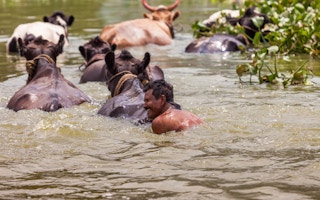The world is falling woefully short in helping poor nations to adapt to the impacts of climate change even though investments in flood protection or drought-resistant crops are a “no brainer” to save lives and money, a UN report showed.
With temperatures setting records in 2023, the study said the gap between the financial needs of vulnerable people to adapt to ever more extreme heat, floods, storms and wildfires and the available funds to do it was 50 per cent wider than estimated just a year ago.
“We are in an adaptation emergency. We must act like it,” UN Secretary-General Antonio Guterres said of Thursday’s study by the UN Environment Programme (UNEP), released before an annual climate summit in Dubai starting on Nov. 30.
“Lives and livelihoods are being lost and destroyed, with the vulnerable suffering the most,” he said.
He said the top priority was “massively increasing finance” from developed countries after a year scarred by extremes including drought in east Africa, floods in China and heatwaves and wildfires in the United States and Europe.
More cash would also benefit donor countries, for instance by ensuring more stable global food supplies and by reducing risks such as increased migration from developing nations, the report showed.
UNEP said projected annual adaptation costs and needs were US$215 billion to US$387 billion a year up to 2030, 10 to 18 times more than the actual finance of just US$21.3 billion in 2021.
Available funding fell by US$4 billion between 2020 and 2021 even as projected needs grew, as rich donor nations cut finance amid the Ukraine war, high inflation, faltering economic growth and the lingering effects of Covid-19 pandemic.
“It’s a no-brainer” to raise finance for adaptation, Andrea Hinwood, chief scientist at UNEP, told Context. “We’re suffering impacts and it’s costing us a bomb”.
The report said that one study showed an additional US$16 billion invested in agriculture per year “would prevent about 78 million people from starving or chronic hunger because of climate change impacts.”
And every US$1 billion spent on adaptation against coastal flooding, driven by rising seas and more powerful storms, would mean a US$14 billion reduction in economic damages, it said.
The report pointed to some innovative ways to raise new adaptation finance.
“
Fossil fuel barons and their enablers have helped create this mess. They need to support those suffering as a result.
Antonio Guterres, secretary-general, United Nations
In Malaysia, for instance, private investors backed a new-built tunnel designed as an income-generating toll road, but which could also be used as spillway during severe flooding.
Hinwood said that she hoped the adaptation gap report would encourage other creative solutions. “This year, with the climate turmoil we’re witnessing, maybe countries will now go ‘actually, adaptation makes sense’. And it does.”
Still, rich nations have repeatedly fallen short of pledges to provide new funds. Two years ago, governments promised to double finance for adaptation to US$40 billion a year by 2025, but even that would be far short of estimated needs.
“The widening gap in adaptation finance is a stark indicator of years of neglect, leaving countless vulnerable people exposed to escalating climate calamities,” said Harjeet Singh, head of global political strategy at Climate Action Network International.
The COP28 climate conference in Dubai is due to launch a new fund to provide help for growing climate “loss and damage”, despite deep splits between rich and poor nations.
Developing nations insist that funding must be in addition to finance for adaptation, which can help limit such losses.
Loss and damage occurs when communities can no longer adapt, for instance when hotter oceans kill off coral reefs, undermining fisheries and coastal livelihoods. Governments are meeting in Abu Dhabi this week to try to resolve disputes over the new fund.
Guterres reiterated calls for governments to tax the windfall profits of the fossil fuel industry to help fund the new loss and damage fund.
“Fossil fuel barons and their enablers have helped create this mess. They need to support those suffering as a result,” he said.
This story was published with permission from Thomson Reuters Foundation, the charitable arm of Thomson Reuters, that covers humanitarian news, climate change, resilience, women’s rights, trafficking and property rights. Visit https://www.context.news/.










